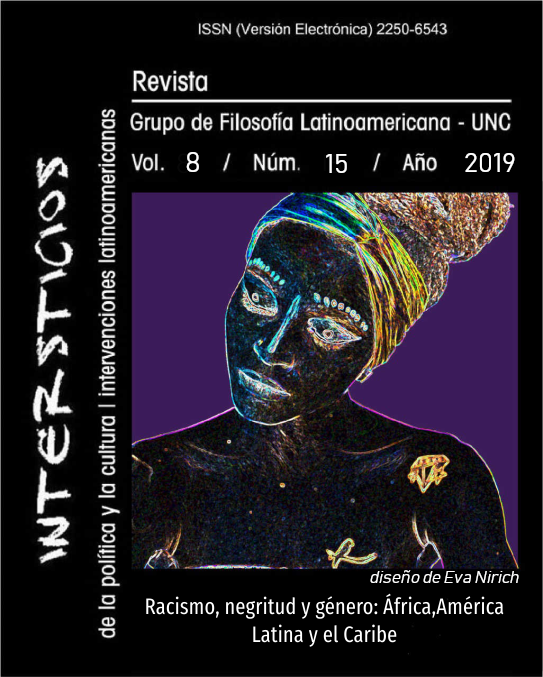Black skin, black verses, black rhythms: polyrhythmia, syncopation and antillanity in the work of Tato Laviera
Keywords:
Rhythm, Negritude, Antillean Culture, Nuyorican Literature, Tato LavieraAbstract
Henry Meschonnic’s critique of Western understanding and theorization of rhythm are illuminating on thinking the singularity of minor poetics such as those of Afro-Antillean poetry and its diasporic derivations such as Tato Laviera's Nuyorican Poetry, whose work eloquently exemplifies the polyrhythmic singularity inscribed within an Afro-Antillean tradition and articulated as a cultural expression of resistance against the hegemonic social devices that confine these minor cultures to a subordinate and passive role. This black rhythm presupposes, in addition, a way of conceiving the world and inhabiting it through a bodily scheme that, following Maurice Merlau-Ponty, at the same time as it inhabits space, perceives and understands it, corporally and fruitively, by means of the Antillean ethos that constitutes it. These black verses, in short, emerge from its black skin emulating the famous title of the Martinican thinker Franz Fanon, whose essay, Black skin, white masks, illuminates clearly how these bodily schemes are always attached to its historical-racial dimension, introducing and thus making visible what Walter Mignolo calls the "colonial difference", that difference introduced by the blackness of the body inscribed in a system of colonial knowledge that constructs it as a racialized body, but which, at the same time, as Fanon points out, allows of its difference an emancipatory movement that is, as we try to demonstrate in this work, the one that guides and promotes the exceptional poetics of writers like Tato Laviera.
Downloads
References
Benítez-Rojo, A. (1989). La isla que se repite: el Caribe y la perspectiva postmoderna. Hanover: Editores del Norte.
Bhabha, H. (2002) El lugar de la cultura. Buenos Aires: Manantial.
Brathwaite, K. (2010) La unidad submarina. Ensayos caribeños. Buenos Aires: Ediciones Katatay.
Castoriadis, C 2007. La institución imaginaria de la sociedad. Buenos Aires: Tusquets.
Colón, H. M. (1985) “La calle que los marxistas nunca entendieron”. Comunicación y Cultura en América Latina. (14): 81-94.
Clément, C. (1990) La Syncope: Philosophie du ravissament. Paris: Grasset.
Cruz-Malavé, A. (2002) “Colonial figures in motion: globalization and translocality in contemporary Puerto Rican Literature in the United
States”. Centro Journal, XIV(2), pp. 5-25.
de Oto, A. (2011) “Aimé Césaire y Frantz Fanon. Variaciones sobre el archivo colonial/descolonial”. Tabula Rasa ,(15), pp. 149-69.
Domínguez Miguela, A. (2009) Pasajes de ida y vuelta: geografías de la identidad en la narrativa puertorriqueña de Estados Unidos. Tesis de
Doctorado por la Universidad de Huelva. En línea: <<http://rabida.uhu.es/dspace/handle/10272/2731>>.
Duany, J. (2002) The Puerto Rican Nation on the Move: Identities on the Island and in the United States. Chapel Hill: University of North Carolina Press.
Glissant, É. ([1981] 2005) El discurso antillano. Caracas: Monte Ávila.
---. 2006. Poetics of Relation. Michigan: Michigan University Press.
Laviera, T. (1979). La carreta made a U-turn. Houston: Arte Público Press.
---. (1981). Enclave. Houston: Arte Público Press.
---. (1985). AmeRícan. Houston: Arte Público Press.
---. (1988). Mainstream Ethics (ética corriente). Houston: Arte Público Press.
---. (2008). Mixturao. Houston: Arte Público Press.
Luis, W. (1992) “From New York to the World: An Interview With Tato Laviera” [Entrevista], Callaloo 15 (4): 1022-1033.
Maglia Vercesi, G. (2005) “Estéticas de resistencia en la poesía del Caribe afrohispánico”, Cuadernos de Literatura X(19): 67-84.
Martínez-San Miguel, Y. (2008) “Boricua (Between) Borders: On the Possibility of Translating Bilingual Narratives”. En: Stavans, Ilan (ed.) Spanglish. Westport: Greenwood Press: 72-87.
Martinez Diente, P. (2006). "`Words Without Borders`: A. Bilingual Conversation with Tato Laviera”. Afro-Hispanic Review, 25(2), pp. 151-58.
Merleau-Ponty, M. (1957). Fenomenología de la percepción. México, Fondo de Cultura Económica.
Meschonnic, H. (1982) Critique du rythme: anthropologie historique du langage. Paris: Verdier.
Mignolo, W. “Diferencia colonial y razón postoccidental”, Anuario Mariateguiano Vol. X, N° 10 (1998): 171-88..
Quintero Rivera, Á. (1998) Salsa, sabor y control: sociología de la música tropical. México: Siglo XXI
Sánchez González, L. (2001) Boricua Literature: A Literary History of the Puerto Rican Diaspora. Nueva York: New York University Press.
Sirvent Ramos, Á. (1987) “En torno al texto. El texto como significancia”, Anales de filología francesa, Nº. 2, pp. 147-156
Weate, J. (2000) “Fanon, Merleau-Ponty and the Difference of Phenomenology”. En: Bernasconi, R. (ed.) Race. Massachussets, Blackwell, pp. 169-181.
Downloads
Published
Issue
Section
License
Authors who have publications with this journal agree to the following terms:
a. Authors will retain their copyright and grant the journal the right of first publication of their work, which will simultaneously be subject to the Creative Commons Attribution License that allows third parties to share the work as long as its author and first publication in this journal are indicated.
b. Authors may adopt other non-exclusive license agreements for distribution of the published version of the work (e.g., deposit it in an institutional telematic archive or publish it in a monographic volume) as long as the initial publication in this journal is indicated.
c. Authors are allowed and encouraged to disseminate their work through the Internet (e.g., in institutional telematic archives or on their web page) after the publication process, which may produce interesting exchanges and increase citations of the published work (see The effect of open access).











